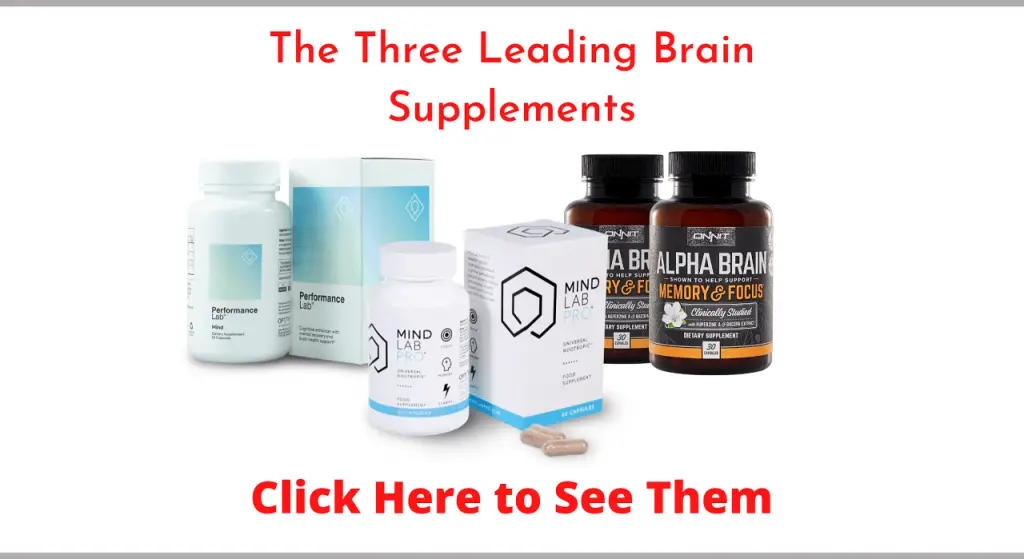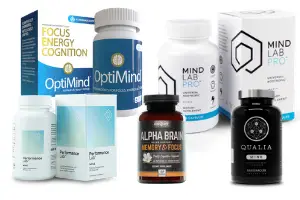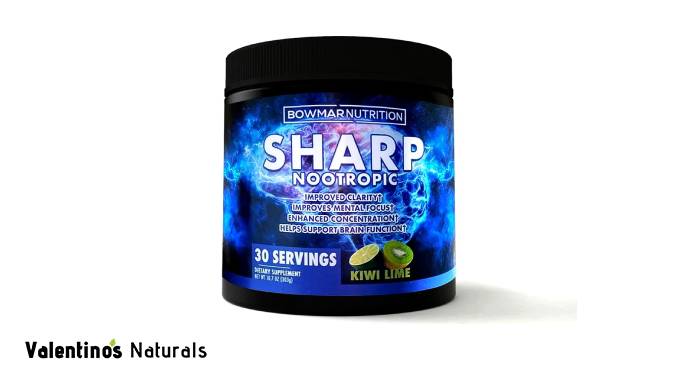Can’t stop worrying thoughts? Is your mind constantly focused on the negative? Natural supplements for rumination and negative thinking might help.
These include Bacopa Monnieri, L-Tyrosine, Rhodiola Rosea, and other science-backed herbs I’ll explore in this article.
Rumination can be a difficult thing to deal with, it distorts your view of the world and can put a strain on your relationships.
For anyone unaware, rumination is a term for dwelling too much about the past or the future, and imagining the worst-case scenarios in our mind. This kind of obsessive thinking is closely linked to anxiety and depression.
Luckily, there are many natural supplements for rumination that work to put you in a calmer and more positive headspace.
The ones listed here are the safest natural options that, unlike many pharmaceuticals, won’t make you dependant on them.
The following natural supplements fight rumination by:
- Tuning your brainwaves to a more tranquil and calm state
- Modulating cortisol levels linked to overthinking and anxiety
- Enhancing brain chemicals for better neurotransmitter balance, associated with positive thinking
No supplements on this list have been proven to treat any medical condition specifically.
However, the following supplements are supported by evidence showing their potential to help with mood, anxiety, and relaxation – which can help you break out of the cycle of obsessive thinking.
What do I currently use?
>The Top 3 Natural Supplements for Mood and Brain Fitness<
1. NAC (N-Acetyl Cysteine)
NAC is a derivative of the natural amino acid L-Cysteine. Your body uses NAC to make more glutathione, your body’s master antioxidant. Higher glutathione levels in the brain are shown to protect neurons from damage and other similar issues. (10)
But NAC doesn’t just help you produce more glutathione. It’s shown to have additional benefits, including improved mood, reduced anxiety, less OCD, and less irritability. (11)
You may find NAC particularly effective at stopping constant worrying thoughts. Many people claim it’s the best single supplement for this purpose.
2. Bacopa Monnieri
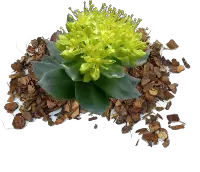
Bacopa Monnieri or Water Hyssop is a creeping herb traditionally used in India for its mental benefits. (7) It helps you with a variety of things, from memory to mood.
The 3 Best Brain Health Supplements
I’ve picked the top three nootropic stacks that are available to you right now for cognitive support.
Bacopa is particularly good at clearing your brain of excess negative thoughts. It does this by balancing your neurotransmitters such as serotonin.
Low serotonin levels are shown to cause a variety of problems, including depressed & anxious mood. (8) This state of mind often leads to ruminating thoughts.
What’s more, Bacopa also improves the growth of your dendrites. (9) Dendrites are the extensions of your brain cells – much like branches on a tree. Through dendrites, your brain cells send signals to each other.
The denser and more developed your dendritic network is, the better your neuron to neuron communication is. Which will help you be more in control of your thoughts.
3. Omega-3s
Omega-3 fatty acids are vital for your brain. 20% of your cerebral cortex is made of DHA, an omega-3 fatty acid. DHA is what helps you repair and build new brain cells.
Studies have shown that omega-3s have a profound impact on our mood, memory, cognition, and many other mental processes. (6) The problem is, omega-3s are mostly found in fish and some plant foods, but many of us don’t consume enough of these. Since your body can’t make omega-3s on its own, that creates a problem.
Lack of DHA intake can reduce your memory. It can also make you moody and irritable. Adding DHA is shown to help with anger in stressed college students during finals.
Therefore, adding omega-3s to your diet – especially DHA – might contribute to a healthier headspace with less ruminating thoughts. (5)

4. Ashwagandha
Ashwagandha means “the smell of the horse” in the Sanskrit language. While it may not actually make you smell like a horse (who would want that?), it is shown to boost vigor, vitality, and mental strength.
A study showed that Ashwagandha can reduce the stress hormone cortisol by as much as 30%. (12) This is big news for anyone who suffers from negative thinking, as cortisol makes it impossible to calm your mind down.
So, if you’re struggling with rumination due to stress & anxiety, Ashwagandha could be the perfect supplement for you.
Related: Boost Nerve Growth With Herbs For Neurogenesis
5. Magnesium
Magnesium is a mineral that most of us are familiar with. It’s essential for our bodies, meaning you must get it from your diet or supplements.
Low magnesium can make you irritable, cause muscle cramps and twitches, and lead to ruminating thoughts. (13)
Magnesium deficiency is surprisingly common these days. (14) Partly due to soil depletion and modern farming methods. And partly due to our diets filled with processed junk.
Even if you eat healthily, it can be hard to get enough magnesium. That’s because most foods contain it in relatively small amounts. You’d have to eat 5 avocados or about 130g of cashews daily to get your daily requirement for magnesium (400mg).
Magnesium is without a doubt one of the most important natural supplements for rumination. But also for other aspects of health like testosterone, cognitive function, and memory.
6. St. John’s Wort
St. John’s Wort is known as a natural antidepressant. This OTC supplement is actually a flowering plant. And it works much like an SSRI; increasing levels of the available serotonin in your brain. (15)
This will naturally put you in a better mood which is associated with less rumination.
Now, it’s important to know that St. John’s Wort is not without side effects. Never take it with another medication, especially an SSRI.
Doing so can lead to serotonin syndrome. Certain compounds in St. Jon’s Wort are also known to cause eye and skin sensitivity.
So if you decide to take this supplement, you might want to bring sunglasses and sunscreen with you on a bright day. Otherwise, it’s best to talk to your doctor about St. John’s Wort if you have any concerns.
With all of that said, St. John’s Wort is shown in studies to be a safe and effective compound when taken in recommended amounts. And it works – which is why I’ve included it on this list.
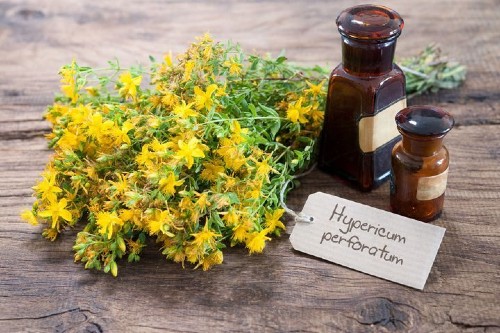
7. L-Tyrosine
Tyrosine is a natural amino acid found in food. It helps your brain make more dopamine. This is a good thing because low dopamine links to mood issues, including anxiety and restlessness which are closely tied to rumination.
Tyrosine is particularly good at keeping you calm, relaxed, and focused during stress. Taking it 30-60 before a challenging event (e.g. a presentation, a school or work project, an intense training session) can boost your performance and reduce overthinking. (16)
Choose N-Acetyl L-Tyrosine over regular Tyrosine if you can. That’s because NALT absorbs better in your brain.
8. Naturally Sourced Vitamin B Complex
B vitamins are the foundations for a healthy brain and mental state. However, some people are deficient in certain B vitamins, such as B6 and B12.
These two are known to play an important role in neurological health, even more so than other B vitamins. For this reason, taking a high-quality B complex can be a great way to improve your mental well-being. (17)
9. Wholefood Vitamin C
Vitamin C is a simple yet powerful vitamin for fighting stress and stressful thoughts. It helps the body better deal with pressure, along with boosting your immune system and antioxidant defenses. Vitamin C also protects your neurons from damage caused by oxidative stress. (18)

10. CBD
CBD is a natural compound from the cannabis plant. Now, unlike THC, CBD is a natural and legal ingredient that won’t get you stoned. In fact, it doesn’t have any psychoactive effects at all.
CBD works by binding to your body’s built-in endocannabinoid receptors which has powerful benefits on mental well being.
Many athletes and professionals use CBD to improve their mood, mental energy, muscle recovery, and resilience to stress.
CBD is particularly good at calming racing thoughts. (19) Which is why people who meditate love to use it – as it can improve the mindfulness practice.
CBD is very well tolerated and non-toxic. It is available in various forms – including capsules, oils, and edibles. In many countries it’s perfectly legal, including in the U.S. However, if you live in another country, make sure to double check before ordering it.
11. Kava Kava
Kava Kava has long been used to treat anxiety. According to research, this herb seems to be on par with some pharmaceutical anxiolytics. (20)
However, in some rare cases it can lead to side effects. Some people quickly build tolerance to it, while others might experience gastrointestinal issues from using Kava.
12. Lemon Balm
Also known as Mellisa Officinalis, Lemon Balm is one of the more popular herbs for calming anxiety and restless thoughts. It contains rosmarinic acid, which acts as a sedative; not only helping with sleep but also improving mood.
(21) Studies suggest that Lemon Balm can even improve your mental function during stress. (22) Lemon balm can help you better control your thoughts, which can be of massive help to those who can’t seem to stop the flood of ruminating thoughts.
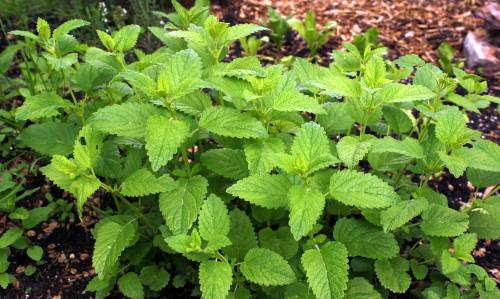
13. Rhodiola Rosea
Rhodiola Rosea is another adaptogen on this list of natural supplements for rumination. Adaptogens are fantastic for stress and anxious thoughts.
They help you deal better with stressful situations and see things from a rational perspective. Rhodiola is particularly good at fighting fatigue and making you more mentally sharp.
(23) In some animal studies, Rhodiola even assisted with brain cell repair and growth. This is important because brain cell decline in the hippocampus is associated with depression and other mental problems closely associated with rumination. (24)
14. Valerian Root
Valerian root is traditionally used as a sleep aid. That’s because it helps boost GABA. A chemical messenger that reduces glutamate activity in the brain. Glutamate is what ‘excites’ your neurons, prompting them to fire more signals to each other.
Too much glutamate links to anxiety and restless thoughts. Therefore, boosting your GABA levels with Valerian will help you to have a less chatty mind. (25)
Best Natural Nootropic for Rumination and Negative Thinking: Mind Lab Pro
Each of the ingredients above is effective at calming obsessive thoughts. But, you can also go for a pre-made stack that uses a number of these ingredients in their highly bioavailable forms.
One such nootropic (brain-supporting) formula is Mind Lab Pro which combines the likes of Rhodiola Rosea, L-Theanine, Bacopa Monnieri, and N-Acetyl L-Tyrosine.
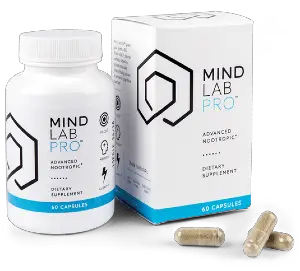
Benefits include:
- Reduces cortisol & stress
- Promotes mental clarity
- Supports emotional well-being
- Helps with focus
Mind Lab Pro’s key features:
- 11 research-backed brain-boosters
- Patented and advanced nutrient forms
- NutriGenesis® nature-identical vitamins
- High-potency, clinical-range dosages
- All dosages shown; no proprietary blends
- Safe, clean, legal and effective
- Third-party tested and validated
- Premium NutriCaps® plant-based capsules
- No pointless ingredients: 100% Brainpower™
The Effects of Rumination on the Body
Rumination creates a vicious cycle where your body is always in the ‘flight-or-fight’ mode. In our early times as humans, this helped us fight or flee from danger. Once the danger passed, our body returned to normal.
However, in today’s world, stress hormones like cortisol stay elevated almost 24/7. Even though you’re just stressed from overthinking and aren’t being chased by a tiger, your body can’t tell the difference on the biological level.
Whether you’re having a heated argument with your coworker, or maybe having a presentation in front of 100 people. Your body sees these things as a life-or-death situation. Over time, this can take its toll on our health.
The Cortisol-Rumination Link
When it comes to stress hormones, cortisol is the main problem. While it’s good for you in small amounts, it’s actually harmful when you have it elevated 24/7.
Cortisol typically spikes in the morning to help wake you up. Then it slowly declines over the course of the day. Until it is at it’s lowest in the evening, so you can relax, unwind, and fall asleep.
- When you’re in a constant stressed state from rumination, you’ll find that your cortisol levels won’t be able to go down naturally. Which can lead to insomnia.
Worse still, chronically high cortisol leads to many other health issues, including obesity, diabetes, brain fog, and more. And it can make rumination worse – leading to a constant cycle of worrying and negative thoughts. (1, 2, 3)
Supplements for rumination can help you in two ways here. First off, they directly reduce rumination and reduce your stress levels with it. Other ruminating supplements on this list work to blunt the stress response. So that you can break out of the cycle of negative thinking.
READ: Vitamins for Low Self Esteem – Which Work?
Anything Else to Consider?
While some of these natural supplements for rumination can have a profound impact on your mental well being. It’s important to remember that they’re not the cure-all panacea.
As I’ve repeated, you should talk with a qualified professional before even considering taking any supplements.
Luckily, there are many other natural ways you can improve your mental state and calm the ‘inner monkey’. Here are a few suggestions:
Meditate
Meditation is an ancient practice from the East. It’s arguably the most effective natural way to tame the restless mind.
Meditate long enough and the size of your prefrontal cortex will increase. At the same time, the amygdala, the fear center responsible for worrying and rumination, decreases from meditation. (26)
Meditation has also been shown to help with self-control, and the ability to redirect your focus to the present moment. All perfect things for breaking out of that rumination cycle.

Go For a Long Run
Exercise, and running in particular, releases endorphins in your brain which improve your mood. (27)
Studies show that running reduces symptoms of anxiety, depression, and other mood disorders. It also helps to improve your overall health and cognitive strength. (28)
Moreover, running puts you in a meditative-like state where you’re fully absorbed in the present moment.
Many people claim that running is like therapy for them. Because it completely clears their minds of negative thoughts.
Talk to a Professional Therapist
In cases like rumination, it’s always best to seek advice from a trained professional. Some of the most effective talk treatments for rumination include cognitive-behavioral therapy (CBT) and the more specific Ed Watkins’ rumination-focused cognitive behavioral therapy.
Both shift your ruminative and negative thoughts to a more healthy and adaptive ways of thinking.

Avoid Inflammatory Foods
Some foods should be avoided generally, but more so if you have problems with rumination. Sugars and processed carbs often spike insulin which is linked to mood swings and irritability.
A diet high in processed foods can also increase inflammation in the body and promote cortisol. Both of which are known for their negative impact on a person’s mental state.
Take a Cold Shower
This might sound counterintuitive, but cold showers will reduce your stress levels, improve mood, and increase alertness.
When you regularly take a cold shower, you’re putting your body through small amounts of stress.
This hardens you both physically and mentally, according to the Wim Hof Method.
Go For a Walk in Nature
Natural supplements for rumination are great, but going for a walk in nature is arguably the most natural and effective way to reduce stress and overthinking.
A large study published in the Journal Ecopsychology found that nature walks promote mental health.
They also “appear to mitigate the effects of stressful life events on perceived stress and negative affect while synergizing with physical activity to improve positive affect and mental well-being,” according to the study researchers. (4)
Natural supplements for rumination Conclusion
Rumination and obsessive thinking can massively impact the quality of life. But you don’t have to suffer.
There are many ways you can encourage a healthier mindset, in a safe and natural manner – including smart supplementation with researched brain health formulas.
The 3 Best Brain Health Supplements
I’ve picked the top three nootropic stacks that are available to you right now for cognitive support.
My list contains some of nature’s best mood enhancers. Mind Lab Pro is My pick of the bunch, as it uses a combination of all-natural ingredients, and is 100% caffeine-free.
This route allows Mind Lab Pro’s “rumination nootropics” to take full effect without triggering more negative thinking that is commonly linked to stimulants.
-Read My Full Mind Lab Pro Review-
*Individual results may vary. Please speak with your doctor or physician before undertaking any new weight reduction, supplement, or exercise regime.
**natural supplements for rumination Disclaimer: The information on this site has not been evaluated by the FDA.
The products on this page are not intended to diagnose, treat, cure, or prevent any disease. Results in description and Testimonials may not be typical results, and user experiences might vary.
References
-
Clinical review: Diagnosis and treatment of subclinical hypercortisolism. (source)
-
The glucocorticoid contribution to obesity. (source)
-
A meta-analytic review of the effects of acute cortisol administration on human memory. (source)
-
Examining Group Walks in Nature and Multiple Aspects of Well-Being: A Large-Scale Study. (source)
-
The Effect of Docosahexaenoic Acid on Aggression in Young Adults. (source)
-
alpha-Linolenic acid dietary deficiency alters age-related changes of dopaminergic and serotoninergic neurotransmission in the rat frontal cortex. (source)
-
Neuropharmacological Review of the Nootropic Herb Bacopa monnieri. (source)
-
Influence of Tryptophan and Serotonin on Mood and Cognition with a Possible Role of the Gut-Brain Axis. (source)
-
Enhancement of basolateral amygdaloid neuronal dendritic arborization following Bacopa monniera extract treatment in adult rats. (source)
-
Effects of N-acetyl-L-cysteine on the reduction of brain dopamine transporters in monkey treated with methamphetamine. (source)
-
N-acetyl cysteine for depressive symptoms in bipolar disorder--a double-blind randomized placebo-controlled trial. (source)
-
A Prospective, Randomized Double-Blind, Placebo-Controlled Study of Safety and Efficacy of a High-Concentration Full-Spectrum Extract of Ashwagandha Root in Reducing Stress and Anxiety in Adults. (source)
-
The Effects of Magnesium Supplementation on Subjective Anxiety and Stress-A Systematic Review. (source)
-
Dietary magnesium intake in a national sample of US adults. (source)
-
A systematic review of St. John’s wort for major depressive disorder. (source)
-
Effect of tyrosine supplementation on clinical and healthy populations under stress or cognitive demands--A review. (source)
-
The Effect of Methylated Vitamin B Complex on Depressive and Anxiety Symptoms and Quality of Life in Adults with Depression. (source)
-
Effects of Oral Vitamin C Supplementation on Anxiety in Students: A Double-Blind, Randomized, Placebo-Controlled Trial. (source)
-
Cannabidiol in Anxiety and Sleep: A Large Case Series. (source)
-
Kava. (source)
-
Pilot trial of Melissa officinalis L. leaf extract in the treatment of volunteers suffering from mild-to-moderate anxiety disorders and sleep disturbances. (source)
-
Lemon Balm. (source)
-
The Effects of Rhodiola rosea L. Extract on Anxiety, Stress, Cognition and Other Mood Symptoms. (source)
-
The effects of Rhodiola rosea extract on 5-HT level, cell proliferation and quantity of neurons at cerebral hippocampus of depressive rats. (source)
-
The Effect of Valeric on Anxiety Severity in Women Undergoing Hysterosalpingography. (source)
-
Meditation-induced neuroplastic changes in amygdala activity during negative affective processing. (source)
-
Physical Exercise for Treatment of Mood Disorders: A Critical Review. (source)
-
The Benefits of Exercise for the Clinically Depressed. (source)


